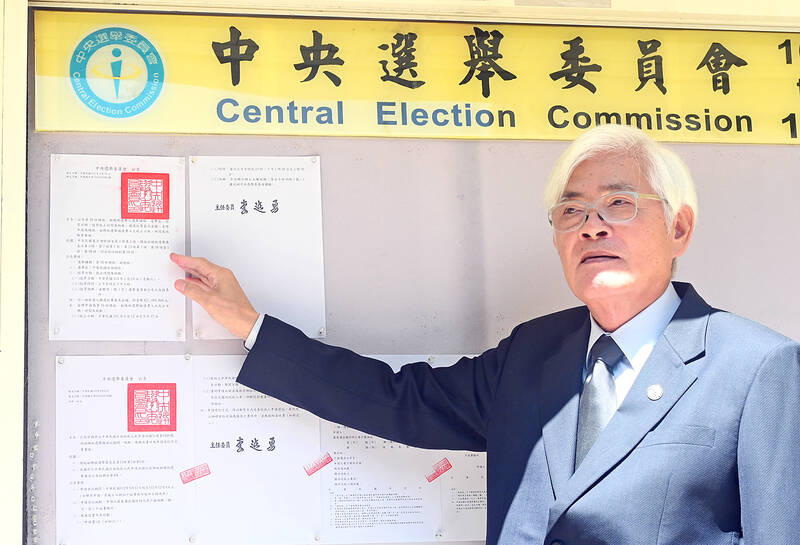Independent presidential hopefuls who collect enough signatures to qualify for the Jan. 13 presidential election would not be in contravention of the law if they drop out as long as they have not registered their candidacy with the Central Election Commission (CEC) as a candidate, CEC Chairperson Lee Chin-yung (李進勇) said yesterday.
Independent presidential hopefuls and their running mates, who are required to pass a petition threshold to qualify, can register as petition initiators with the CEC from today until Sunday, and can submit signatures from Tuesday next week to Nov. 2, the CEC said.
The results of the petitions would be announced by Nov. 14, it added.

Photo: Wang Yi-sung, Taipei Times
On whether independent presidential hopefuls who have launched a petition for candidacy would be in contravention of Article 30 of the Presidential and Vice Presidential Election and Recall Act (總統副總統選舉罷免法) if they later decide to pull out of the race, Lee said: “If they do not register, withdrawal is not an issue. If they have registered, then withdrawal is out of the question.”
Hon Hai Precision Industry Co founder Terry Gou (郭台銘) last month announced his presidential bid, but has yet to announce his running mate.
Asked if independent presidential aspirants are legally liable if they abandon their campaign after submitting signatures to the commission, Lee said such an action would not be an infraction, as that would just mean they have forfeited the opportunity to register as presidential candidates.
“The decision of whether or not aspirants register as candidates falls within their civil right to participate in political affairs, and the CEC shall respect that decision,” CEC Vice Chairperson Chen Chao-chien (陳朝建) added.
“However, once they have registered as candidates under the act, they cannot withdraw their candidacy,” he said.
Candidates nominated by parties or independent candidates who collect enough signatures to qualify as candidates in the presidential election are required to register from Nov. 20 to 24.
Under the act, independent presidential hopefuls must obtain 289,667 signatures, or 1.5 percent of eligible voters in the previous presidential election, to qualify as candidates.
Those who attempt to “negotiate other candidates out” of the election by promising or giving them bribes or other undue benefits risk a prison term of three to 10 years and a fine of NT$2 million to NT$20 million (US$62,438 to US$624,376) under the act, Chen said.
Those who attempt to bribe eligible voters to petition for or against a presidential hopeful face a prison term of one to seven years and a fine of NT$1 million to NT$10 million, he said.

The Ministry of Education (MOE) is to launch a new program to encourage international students to stay in Taiwan and explore job opportunities here after graduation, Deputy Minister of Education Yeh Ping-cheng (葉丙成) said on Friday. The government would provide full scholarships for international students to further their studies for two years in Taiwan, so those who want to pursue a master’s degree can consider applying for the program, he said. The fields included are science, technology, engineering, mathematics, semiconductors and finance, Yeh added. The program, called “Intense 2+2,” would also assist international students who completed the two years of further studies in

Former president Tsai Ing-wen (蔡英文) departed for Europe on Friday night, with planned stops in Lithuania and Denmark. Tsai arrived at Taiwan Taoyuan International Airport on Friday night, but did not speak to reporters before departing. Tsai wrote on social media later that the purpose of the trip was to reaffirm the commitment of Taiwanese to working with democratic allies to promote regional security and stability, upholding freedom and democracy, and defending their homeland. She also expressed hope that through joint efforts, Taiwan and Europe would continue to be partners building up economic resilience on the global stage. The former president was to first

Taiwan will now have four additional national holidays after the Legislative Yuan passed an amendment today, which also made Labor Day a national holiday for all sectors. The Chinese Nationalist Party (KMT) and Taiwan People’s Party (TPP) used their majority in the Legislative Yuan to pass the amendment to the Act on Implementing Memorial Days and State Holidays (紀念日及節日實施辦法), which the parties jointly proposed, in its third and final reading today. The legislature passed the bill to amend the act, which is currently enforced administratively, raising it to the legal level. The new legislation recognizes Confucius’ birthday on Sept. 28, the

The Taipei District Court sentenced babysitters Liu Tsai-hsuan (劉彩萱) and Liu Jou-lin (劉若琳) to life and 18 years in prison respectively today for causing the death of a one-year-old boy in December 2023. The Taipei District Prosecutors’ Office said that Liu Tsai-hsuan was entrusted with the care of a one-year-old boy, nicknamed Kai Kai (剴剴), in August 2023 by the Child Welfare League Foundation. From Sept. 1 to Dec. 23 that year, she and her sister Liu Jou-lin allegedly committed acts of abuse against the boy, who was rushed to the hospital with severe injuries on Dec. 24, 2023, but did not